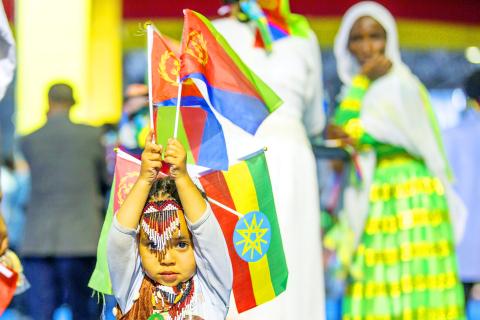Eritrean President Isaias Afwerki reopened his nation’s embassy in Ethiopia yesterday, more than 20 years after the two countries broke off relations when they went to war.
The embassy inauguration caps Isaias’ historic visit to the Ethiopian capital aimed at cementing peace less than a week after the two nations declared an end to two decades of conflict.
State-run Ethiopian Broadcasting Corp (EBC) showed Isaias raising the Eritrean flag at the embassy in downtown Addis Ababa and accepting from Ethiopian Prime Minister Abiy Ahmed keys to the building, filled with dusty furniture that appeared untouched for years.

Photo: AP
The embassy visit marked the end of the Eritrean leader’s three-day stay in Ethiopia that also included a visit to an industrial park and a Sunday evening dinner and concert attended by thousands of Ethiopians.
“The high-level Eritrean government delegation headed by President Isaias just left Addis Ababa for Asmara,” EBC reported after Isaias departed the embassy.
Ethiopia and Eritrea expelled each other’s envoys at the start of a 1998 to 2000 border war that killed about 80,000 people.
Relations remained frozen after Ethiopia declined to accept a 2002 UN-backed border demarcation, leading to years of cold war between the two nations.
Last month, Abiy announced Ethiopia would accept the demarcation and cede land to Eritrea, paving the way for normalization.
Abiy has pursued an aggressive reform agenda since taking office in April, including making peace with Eritrea, releasing jailed dissidents and liberalizing parts of the economy.
Once a province of Ethiopia, Eritrea voted to leave in 1993 after a bloody, decades-long independence struggle.
Since the end of the war, Isaias has used the threat of Ethiopia aggression to justify a rash of repressive policies, including an indefinite national service program the UN has likened to slavery.
Ethiopian Ministry of Foreign Affairs spokesman Meles Alem said that Ethiopia has not yet reopened its embassy in the Eritrean capital, Asmara.

ECONOMIC WORRIES: The ruling PAP faces voters amid concerns that the city-state faces the possibility of a recession and job losses amid Washington’s tariffs Singapore yesterday finalized contestants for its general election on Saturday next week, with the ruling People’s Action Party (PAP) fielding 32 new candidates in the biggest refresh of the party that has ruled the city-state since independence in 1965. The move follows a pledge by Singaporean Prime Minister Lawrence Wong (黃循財), who took office last year and assumed the PAP leadership, to “bring in new blood, new ideas and new energy” to steer the country of 6 million people. His latest shake-up beats that of predecessors Lee Hsien Loong (李顯龍) and Goh Chok Tong (吳作棟), who replaced 24 and 11 politicians respectively

Archeologists in Peru on Thursday said they found the 5,000-year-old remains of a noblewoman at the sacred city of Caral, revealing the important role played by women in the oldest center of civilization in the Americas. “What has been discovered corresponds to a woman who apparently had elevated status, an elite woman,” archeologist David Palomino said. The mummy was found in Aspero, a sacred site within the city of Caral that was a garbage dump for more than 30 years until becoming an archeological site in the 1990s. Palomino said the carefully preserved remains, dating to 3,000BC, contained skin, part of the

Russian hackers last year targeted a Dutch public facility in the first such an attack on the lowlands country’s infrastructure, its military intelligence services said on Monday. The Netherlands remained an “interesting target country” for Moscow due to its ongoing support for Ukraine, its Hague-based international organizations, high-tech industries and harbors such as Rotterdam, the Dutch Military Intelligence and Security Service (MIVD) said in its yearly report. Last year, the MIVD “saw a Russian hacker group carry out a cyberattack against the digital control system of a public facility in the Netherlands,” MIVD Director Vice Admiral Peter Reesink said in the 52-page

‘WATER WARFARE’: A Pakistani official called India’s suspension of a 65-year-old treaty on the sharing of waters from the Indus River ‘a cowardly, illegal move’ Pakistan yesterday canceled visas for Indian nationals, closed its airspace for all Indian-owned or operated airlines, and suspended all trade with India, including to and from any third country. The retaliatory measures follow India’s decision to suspend visas for Pakistani nationals in the aftermath of a deadly attack by shooters in Kashmir that killed 26 people, mostly tourists. The rare attack on civilians shocked and outraged India and prompted calls for action against their country’s archenemy, Pakistan. New Delhi did not publicly produce evidence connecting the attack to its neighbor, but said it had “cross-border” links to Pakistan. Pakistan denied any connection to